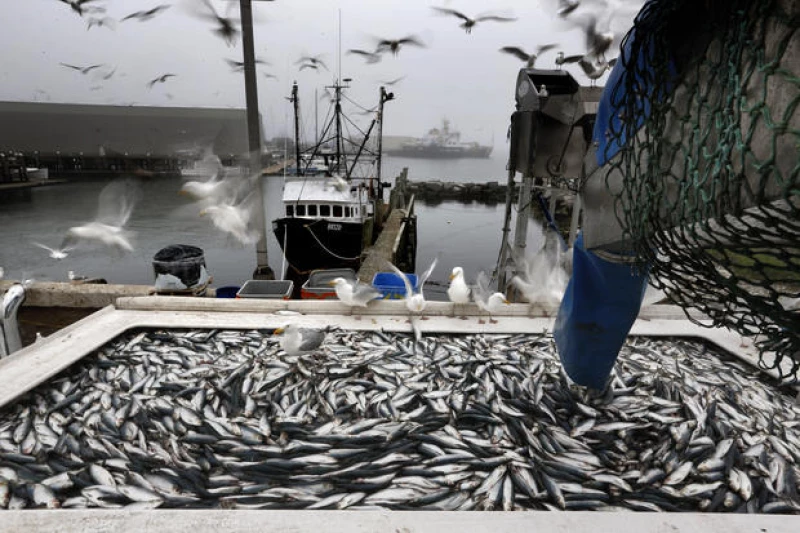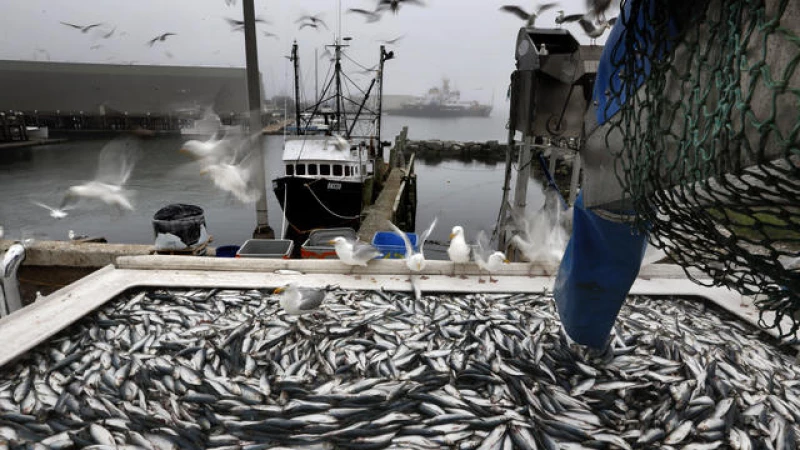Supreme Court to Hear Dispute on Herring Regulation
Washington — They can be pickled, smoked or used for bait, but on Wednesday, the silvery, skinny fish known as the herring will be the focus of a dispute that could end with the U.S. Supreme Court reeling in the ability of federal agencies to regulate the environment, health care and the workplace.
Underpinning the legal fight is a 40-year-old decision that, if wiped away by the court's expanded conservative majority, could diminish the so-called administrative state, long a goal of the conservative legal movement.
Known as "Chevron deference," after a landmark 1984 ruling involving the oil and gas giant, the longstanding doctrine requires courts to defer to an agency's reasonable interpretation of ambiguous laws passed by Congress. Critics of the framework argue it gives federal bureaucrats too much power in crafting regulations that affect major swaths of American life.
On Wednesday, the court will hear a pair of challenges to a 2020 regulation that required fishermen in the Atlantic herring fishery to pay for monitors who collect data and oversee operations while they're at sea.
The regulation
Fishing vessels have taken federal observers on trips for decades. But under the program enacted by the National Marine Fisheries Service during the Trump administration, they had to foot the bill for monitoring, which cost more than $700 per day, according to government estimates. The agency implemented the regulation under a 1976 law.
But to the fishermen, the government mandating they pay for at-sea monitors is like a town requiring residents to foot the bill for a police officer who rides in their cars and issues them speeding tickets, according to Meghan Lapp, the fisheries liaison for Seafreeze. The company operates two vessels, F/V Relentless and F/V Persistence, in the Atlantic herring fishery.
"This is inherently a government function, and we have no problem with taking the observers as required by Congress," she said. "But Congress did not require us to pay for them, and that is a huge distinction."
Seafreeze's style of fishing allows its vessels to remain at sea longer than others, typically 10 to 14 days, and they have the flexibility to target other species, like mackerel or squid, in addition to herring. But the regulation means that they may be on the hook for the federal monitor, even if they catch little to no herring. If they choose to leave the dock without a monitor and one is required, they can't fish for herring on that trip.
"It can push us out of this fishery," she said. "We've done it by the law, sustainably, the whole nine yards. But we're basically getting financially excluded from this fishery unless we want to be paying for a herring program out of the proceeds of other species. This makes going herring fishing or having that option financially prohibitive."
The fishermen go to court
The program enacted by the National Marine Fisheries Service, part of the Commerce Department, aims to have federal observers, who collect data needed for the conservation and management of the fishery, on 50% of trips by licensed vessels in the Atlantic herring fishery. But if there aren't enough government-funded observers to meet that target, the National Marine Fisheries Service can decide to waive monitoring for a trip or require an industry-funded monitor to fill the gap.
One month after the rule was finalized by the federal government, Seafreeze sued the service, alleging the agency did not have the authority to mandate industry-funded monitoring.
A federal district court in Rhode Island ruled for the federal government, applying a two-step framework under Chevron deference.
U.S. District Judge William Smith concluded in September 2021 that under the first step of the Chevron analysis, the federal law underlying the new monitoring rule was ambiguous. He also concluded that the National Marine Fisheries Service's decision to require fishermen to pay for the observers was allowed.
The U.S. Court of Appeals for the 1st Circuit has affirmed the lower court's ruling, stating that the 2020 rule was a valid exercise of the agency's authority under Chevron and was legal.
A similar case in Rhode Island mirrors a separate dispute filed by four commercial fishing companies in New Jersey at the federal district court in Washington, D.C. in February 2020. These companies are involved in the Atlantic herring fishery.
In the Washington, D.C. case, the district court concluded that the 1976 law clearly grants the National Marine Fisheries Service extensive authority to establish regulations necessary for conservation and fishery management measures.
A divided three-judge panel at the U.S. Court of Appeals for the District of Columbia Circuit determined that the statute is not entirely clear on whether the government can require vessels to cover the costs of at-sea monitoring. As a result, they proceeded to the second step of the Chevron framework. They ultimately found that the fisheries service's interpretation of the law is a reasonable approach to address the absence of clear guidance on the issue of at-sea monitoring costs, and therefore deferred to the agency.
The Supreme Court to Revisit Chevron Deference
In a case brought in Washington, the Supreme Court has agreed to review the 1st Circuit's decision regarding Chevron deference. The concept of Chevron deference, established in the Supreme Court's 1984 decision in Chevron v. National Resources Defense Council, allows agencies to interpret statutes and regulations within their jurisdiction. However, critics argue that this precedent violates due process and restricts the independent judgment of federal judges.
The case at hand involves a suspended industry-funded monitoring program for the Atlantic herring industry. The program was suspended in April 2023 due to a lack of federal funding, and the fishermen were subsequently reimbursed. The Supreme Court will now decide whether to overrule Chevron or provide further clarification on its framework.
Justice Ketanji Brown Jackson recused herself from the case, as she was part of the three-judge panel that initially heard oral arguments before the D.C. Circuit. All nine justices will participate in the review of the 1st Circuit's decision.

Source: NOAA Fisheries
"Under Chevron, judges are required to give preference to the government's interpretation of the law in administrative law cases," said Mark Chenoweth, president and chief legal officer of the New Civil Liberties Alliance. "This unique aspect of our system means that even if a judge believes a party has a stronger interpretation of the statute than the agency, they will still lose as long as the agency's interpretation is deemed reasonable. This goes against the principles of due process."
The Rhode Island case, brought by the New Civil Liberties Alliance on behalf of Seafreeze, is challenging the Chevron doctrine.
However, proponents of agency deference argue that overturning Chevron would hinder agencies' ability to create regulations in areas such as the environment, nuclear energy, and healthcare. They also argue that it would make it more difficult to implement laws passed by Congress.
"The stakes in these cases are high, as it could impact the administrative state and the government's ability to govern," said Clare Pastore, a law professor at the University of Southern California. "The question is how specific Congress needs to be in outlining its intentions."
Pastore, who has experience as a staff attorney at a public-interest law firm, acknowledged that Chevron deference favors agencies. However, she expressed concerns that if the Supreme Court ends the doctrine, it may not replace it with a standard that still allows for deference in certain circumstances.
Abandoning Chevron Could Shift Power to the Courts
A recent debate has emerged regarding the future of Chevron, a legal doctrine that gives deference to federal agencies in interpreting statutes. Critics argue that abandoning Chevron could result in the court gaining more power to make decisions, potentially leading to a void in regulation or a halt in administrative actions.
One concern raised is that the court could declare regulations invalid and require Congress to address the issue, which may not always be feasible. This could potentially grind the entire administrative state to a halt, according to some experts.
On the other hand, some argue that the trust should lie with the agencies, as they possess expertise in interpreting federal statutes, especially those of a scientific or technical nature. The Biden administration has defended Chevron as a "bedrock principle of administrative law" that allows agencies to bring their expertise to bear.
However, there are those who believe that judges are capable of handling the complexity of cases where Chevron is invoked. Elizabeth Prelogar, the Solicitor General, emphasized that Chevron has been invoked in thousands of decisions, providing a settled body of law that private parties have relied upon for making investment decisions and entering into contracts.
The debate over Chevron's future continues, with implications for the balance of power between agencies and the courts.
Source: Supreme Court Filing
Supreme Court Considers Overturning Precedent in Administrative Law Cases
"Most of the time, these administrative law cases boil down to statutory interpretation, which is the expertise of judges, not the expertise of the executive branch," a legal expert stated.
The Supreme Court has demonstrated a willingness to overturn longstanding precedents in recent terms. In June 2022, the justices reversed the landmark 1973 Roe v. Wade decision that established the constitutional right to abortion, and they also ended the use of race as a factor in college admissions last year.
Furthermore, Justices Clarence Thomas and Neil Gorsuch have expressed their views on the need to eliminate the Chevron doctrine. In a dissenting opinion in November 2022, Gorsuch wrote, "At this late hour, the whole project deserves a tombstone no one can miss. We should acknowledge forthrightly that Chevron did not undo, and could not have undone, the judicial duty to provide an independent judgment of the law's meaning in the cases that come before the nation's courts. Someday soon I hope we might."
A decision from the Supreme Court is expected by the summer.







